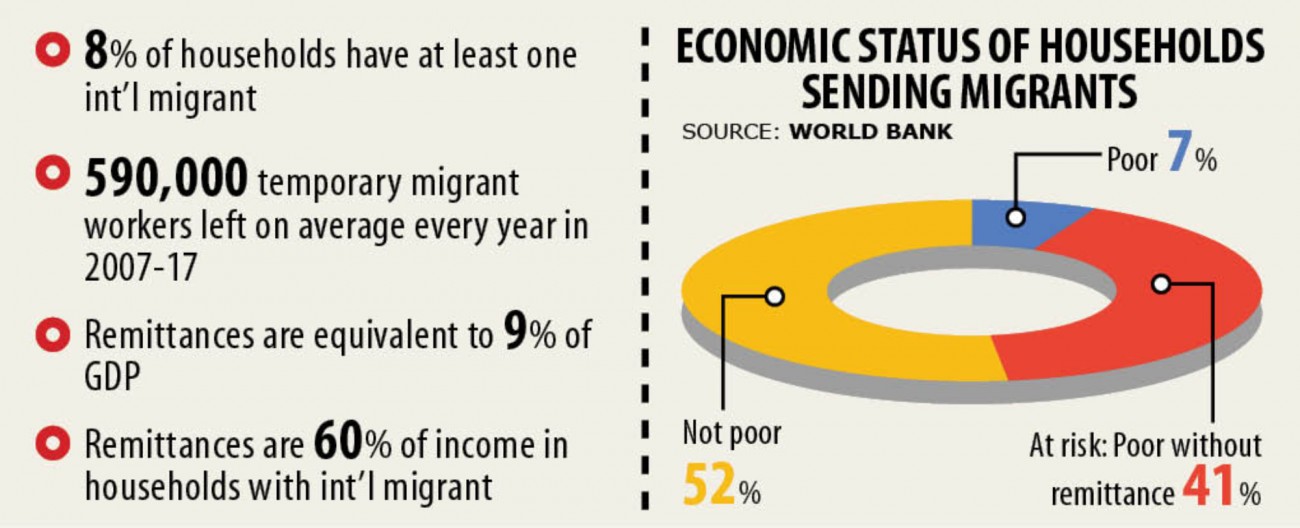41pc households with migrants to be poor without remittance: WB

Forty-one percent of households with at least one family member engaged as a migrant worker would be in poverty without remittance, said a senior World Bank official yesterday.
International migration helps many households come out of poverty but challenges for migration are greater for the poor, said Stefano Paternostro, practice manager for social protection and jobs for South Asia at the Washington-based multilateral lender.
“High intermediation costs lead to lower access and greater vulnerability, especially for the poor,” he said at a roundtable on “Inclusive jobs for youth: challenges and solutions in Bangladesh” organised by World Bank at InterContinental Dhaka.
Paternostro said the labour force was growing by 1.7 million per year but the domestic labour market was currently unable to provide jobs at a sufficient pace.
Unemployment among youth increased to 11.6 percent in 2018 from just over 6 percent in 2010 and is higher than the South Asian average of 10.6 percent, according to a presentation by Paternostro.
Of the employed youth, most work in low-paid and low-productive informal sector, especially in urban areas.
Less educated youth, especially those from poorer households, tend to be in informal and low productivity jobs in the domestic labour market. Poor youth are often unable to access the many programmes that are available for improving incomes because of many factors, said the bank in a summary of the event.
“International migration, which provides access to good jobs in overseas markets, is also often inaccessible to these youth due to a lack of information and high costs.”
Paternostro said 590,000 migrant workers left Bangladesh on an average every year from 2007 to 2017 and 8 percent of the households have at least one international migrant. Remittances account for 60 percent of income in households with international migrant. “International migration has been a major driver of economic growth,” he said, suggesting increasing access of the poor to international migration.
Intermediary fees account for 57 percent of the total cost of migration, according to his presentation. “High cost of migration is the biggest problem we have been facing,” said Ahmed M Saleheen, additional secretary to the expatriate welfare and overseas employment ministry. He said there was a pervasive presence of middlemen in the recruitment process with or without accountability. Low education and skill increases vulnerability, he added.
Qazi Kholiquzzaman Ahmad, chairman of Palli-Karma Sahayak Foundation (PKSF), said there has to be a strategy for sustained employment.
He said the present system of measuring unemployment does not reflect the actual picture of joblessness.
The state-run Bangladesh Bureau of Statistics puts the unemployment figure at 4.2 percent. But citing one of his papers, Ahmad said the rate of unemployment would be 35 percent if annual time availability and work hours were taken into consideration.
The PKSF has got 17,000 applications against 14 vacant posts recently, he said.
Azizul Alam, additional secretary to the finance ministry, said Bangladesh’s economy grew 6.6 percent annually in the last one decade and has done well in various socioeconomic indicators. But high growth did not commensurate with job growth.
Employment growth slowed to 1.8 percent in 2010-2015 from 3.1 percent in 2003-2010. Employment in agriculture and construction contracted while employment growth in the garment sector halted, he said.
Alam said capital deepening in manufacturing and construction, explosive growth of general education at higher secondary and tertiary level, a lack of quality technical education, skill mismatch and high cost of overseas employment were the main factors behind the sluggish growth of jobs.
He said the government has taken several measures, including establishment of economic zones and hi-tech parks and reforms in policies to improve investment and business climate. The government has also taken up skill enhancement programmes to develop human resources with market-responsive skills.
Against this backdrop, overseas jobs can reduce the unemployment rate and help the country realise the benefit of demographic dividend, accelerate poverty reduction and economic growth, Alam said.
Mercy Tembon, country director of the WB for Bangladesh and Bhutan, said young people were extremely important for the development of any country. But youth unemployment has increased by 6 percentage points creating concerns.
WB Regional Director Lynne Sherburne-Benz also spoke.
